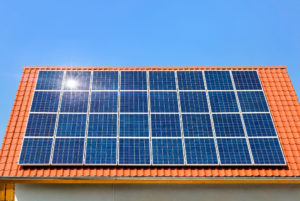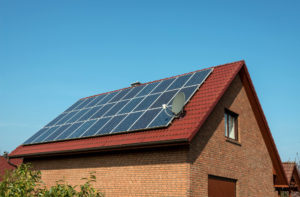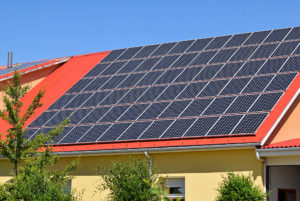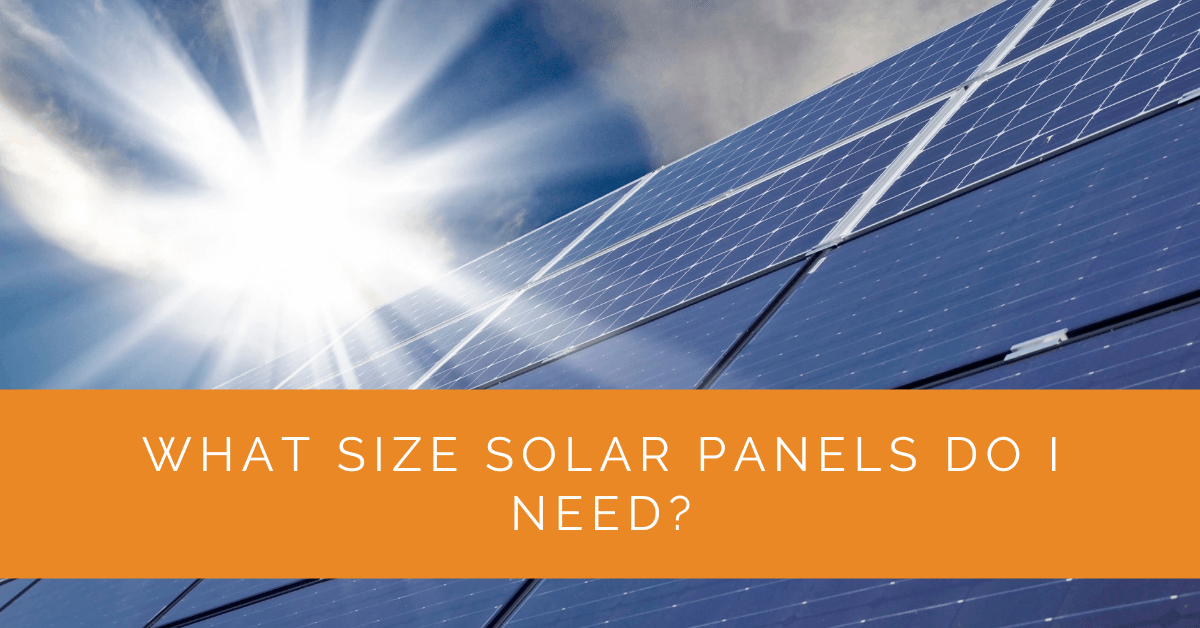Selecting the ideal size for your solar panels is crucial in embracing the clean and sustainable energy solar power provides. This decision impacts the efficiency and effectiveness of your solar system and plays a significant role in your long-term savings and environmental footprint. This guide will delve deep into the intricacies of determining the optimal solar panel size for your unique requirements. By the end of this article, you will have a thorough understanding of all the factors that influence this important decision.
Contents
- 1 Key Takeaways
- 2 Factors Affecting Solar Panel Sizing
- 3 Calculating the Number of Solar Panels
- 4 Determining Your Solar Needs
- 5 Case Study: Optimizing Solar Panel Size for a Residential Home
- 6 Expert Insights From Our Solar Panel Installers About What Size Solar Panels You Need
- 7 Experience Solar Excellence with Us!
- 8 Conclusion
Key Takeaways
- Solar panel size is a critical factor in maximizing the efficiency and effectiveness of your solar energy system, impacting your savings and environmental footprint.
- Factors such as solar panel output, location, energy requirements, and budget are key in determining the right solar panel size.
- Utilizing solar panel calculators, consulting with experts, and carefully assessing your energy goals are essential in choosing the optimal solar panel size.
Factors Affecting Solar Panel Sizing
Choosing the right size for your solar panels is far from a one-size-fits-all task. Several factors come into play, and understanding their influence is key to making an informed decision.
Solar Panel Output and Efficiency
Solar panels vary widely in their ability to convert sunlight into electricity. High-efficiency panels can harness more energy from the same amount of sunlight than their less-efficient counterparts. Examining the wattage per panel is crucial as it directly influences your solar array’s potential output. Investing in high-efficiency panels can generate greater energy, even in limited space.
Calculating Your Solar Energy Requirements
To accurately determine the number of solar panels you need, gauge your electricity consumption, typically measured in kilowatt-hours (kWh). Analyze your utility bills to establish your average monthly or yearly usage. This data will serve as the foundation for estimating your solar energy needs. Consider seasonal variations and changes in your electricity usage over time.
The Impact of Location and Sunlight
Geographical location is a significant factor influencing your solar panel size. Areas with abundant sunlight will require fewer panels to meet energy needs. The angle and orientation of your panels also play a critical role in efficiency. Optimal positioning ensures panels capture the maximum sunlight throughout the day. Factors such as shading from nearby structures or trees should also be considered.
Home Solar Systems: Sizing for Residential Needs
Residential solar panel systems vary widely in size. The size you require depends on factors such as available roof space, budget, and your energy consumption. Consider the size of your family, your daily routines, and any plans for home expansion or electric vehicle charging.

Calculating the Number of Solar Panels
Precisely determining the number of solar panels for your installation is vital to ensure your system aligns with your energy goals. Several methods and considerations can guide you through this process.
Using a Solar Panel Calculator
Solar panel calculators, available online, simplify the complex calculations involved in sizing a solar panel system. They account for your location, energy requirements, panel efficiency, and other variables to estimate your solar needs. These tools empower you to make informed decisions. Consider using a solar calculator offered by a reputable solar energy provider or consult a professional solar installer for a precise estimate.
Determine Your Solar Panel Needs
Beyond calculator estimates, consider your long-term energy needs. Factor in any planned energy-efficient upgrades or additions to your home. Additionally, assess the expected lifespan of your solar panels and how they will continue to meet your evolving requirements over the years. Consultation with a solar professional can help determine the best fit for your unique circumstances.
Consideration of Solar Panel Cost
While assessing solar panel size, balancing energy needs and budget constraints is crucial. Solar panel costs vary based on quality, efficiency, and brand. Careful evaluation of your financial resources will help you find the best system that offers maximum value. Remember that although high-quality, high-efficiency panels may have a higher upfront cost, they can yield greater long-term savings due to increased energy generation.
System Size and Solar Power Generation
The size of your solar panel system directly correlates with its energy output. Larger systems can generate more electricity, potentially exceeding your consumption. Any surplus energy can be fed back into the grid, earning you credits or compensation. Consider your long-term energy goals when determining the system size. Do you want to offset your energy bill, achieve energy independence, or even generate excess energy to sell back to the grid? Each objective will significantly influence the size of your solar panel system.

Determining Your Solar Needs
Determining your solar needs involves meticulous analysis of your electricity consumption patterns, energy objectives, and specific system requirements.
Assessing Your Electricity Consumption
Review your past electricity bills to accurately ascertain your solar needs and identify your average monthly and yearly usage. This data forms the basis for calculating your solar panel system size. Break down your energy consumption by month to account for seasonal variations.
How Much Solar Do You Need to Power Your Home?
The amount of solar energy required to power your home hinges on several factors, including location, energy-efficient appliances, and your desired level of energy independence. Some homeowners aim to cover their energy consumption with solar power, while others opt for partial solar solutions. Consider the environmental impact and long-term savings associated with achieving energy independence.
Estimating Your Energy Needs
Define your energy consumption goals clearly. Are you striving to offset a portion of your energy bill, achieve complete energy independence, or generate excess energy to sell back to the grid? Each objective will significantly influence your solar panel system size. Remember that energy needs may change over time as energy efficiency technologies advance.
Solar System Size for Off-Grid and On-Grid Solutions
Off-grid and on-grid solar systems have distinct size requirements. Off-grid systems must generate all your energy needs, making them typically larger than on-grid systems, which can rely on the grid as a backup. Off-grid solutions require more careful planning and consideration of battery storage capacity to ensure continuous power supply.

Case Study: Optimizing Solar Panel Size for a Residential Home
Background
Solar Panels Network USA collaborated with a family in California looking to install a solar panel system to reduce their electricity bills and carbon footprint. The goal was to determine the optimal size for their solar panel system, balancing their energy needs, available roof space, and budget.
Project Overview
The family wanted a solar solution that would cover their average electricity consumption and potentially allow for some energy to be fed back into the grid. This case study outlines the steps taken to assess their energy needs and design a system that met their goals.
Implementation
Assessing Energy Consumption
We began by analyzing the family’s electricity bills over the past year to understand their average monthly and yearly consumption in kilowatt-hours (kWh). This analysis provided a baseline for estimating the required size of the solar panel system.
Considering Location and Sunlight
Given the home’s location in sunny California, the panels would receive ample sunlight throughout the year. We used solar calculators to factor in the angle of the roof, potential shading from nearby trees or buildings, and the optimal tilt and azimuth angles for maximum efficiency.
Choosing High-Efficiency Panels
To maximize energy production within the available roof space, we recommended high-efficiency monocrystalline solar panels. These panels are known for their superior performance and space-saving benefits, making them ideal for residential installations.
Calculating the Number of Panels
Based on the family’s average energy consumption and the efficiency of the chosen panels, we calculated the number of panels needed. We aimed for a system that could generate slightly more than their average consumption to account for potential increases in future energy use and to allow for some energy to be fed back into the grid.
Designing the System
We designed the system layout to ensure optimal placement and orientation of the panels, considering both aesthetic and functional aspects. The design included detailed plans for panel placement, wiring, and inverter location, ensuring easy maintenance and maximum efficiency.
Installation and Testing
Our installation team meticulously installed the solar panels, ensuring all connections were secure and that the system was set up according to the design specifications. We conducted thorough testing to ensure the system’s performance met expectations, checking for any issues that could affect efficiency.
Results
The installed solar panel system met the family’s energy needs, generating enough electricity to cover their average consumption and even producing excess energy during peak sunlight hours. This excess energy was fed back into the grid, earning them credits on their electricity bill. The family reported significant savings on their energy bills and expressed satisfaction with their reduced carbon footprint.
Summary
This case study highlights the importance of a thorough assessment and careful planning in determining the optimal size for a residential solar panel system. By analyzing energy consumption, considering location-specific factors, and choosing high-efficiency panels, Solar Panels Network USA successfully designed and installed a system that met the family’s energy needs and provided long-term savings.
Proper sizing and installation are crucial for maximizing the benefits of solar energy. This project demonstrates how personalized solutions, expert guidance, and high-quality components can lead to a successful and sustainable solar energy system, promoting both financial savings and environmental responsibility.
Expert Insights From Our Solar Panel Installers About What Size Solar Panels You Need
Understanding your energy consumption is the first step in determining the right size for your solar panels. Analyzing your utility bills can provide a clear picture of your energy needs, helping you to size your system accurately.
Senior Solar Installer
Location plays a critical role in solar panel efficiency. Factors such as shading, orientation, and the angle of your panels can significantly impact the energy output. Optimizing these elements ensures you get the most out of your solar installation.
Lead Solar Technician
Investing in high-efficiency panels might have a higher upfront cost, but the long-term savings and energy production can outweigh the initial investment. It’s about balancing your budget with the need for reliable and sustainable energy.
Solar Installation Expert
Experience Solar Excellence with Us!
Trust in Solar Panels Network USA, where our seasoned experts deliver top-quality solar solutions for homes and businesses nationwide. With a legacy of countless successful installations and a commitment to sustainable energy, we’re your reliable partner in the solar journey. Ready for a brighter, eco-friendly future? Call us now at (855) 427-0058 and harness the power of the sun!
Conclusion
In our extensive experience, choosing the right size of solar panels for your solar energy system is a critical decision with far-reaching implications. It demands a meticulous assessment of your energy consumption, location, and budgetary considerations. By comprehending the many factors influencing the number of solar panels you need, you can make an informed choice that optimizes your solar power generation and minimizes your environmental impact.
Calculating the number of solar panels you need involves thoroughly examining your energy requirements, location-based factors, and financial resources. Solar panel calculators, while valuable tools, should be supplemented with expert advice to account for unique circumstances. Whether considering a residential solar panel system or a commercial solar installation, the correct solar panel size is the cornerstone of a successful and sustainable solar energy solution.
Carefully weigh your options and reap the benefits of clean, renewable solar power for years. Your energy future begins with the right solar panel size, and your choices today will impact your sustainability, savings, and environmental stewardship for years to come.
About the Author
Solar Panels Network USA stands at the forefront of solar energy solutions, driven by a team of seasoned solar engineers and energy consultants. With over decades of experience in delivering high-quality solar installations and maintenance, we are committed to promoting sustainable energy through customer-centric, tailored solutions. Our articles reflect this commitment, crafted collaboratively by experts to provide accurate, up-to-date insights into solar technology, ensuring our readers are well-informed and empowered in their solar energy decisions.

